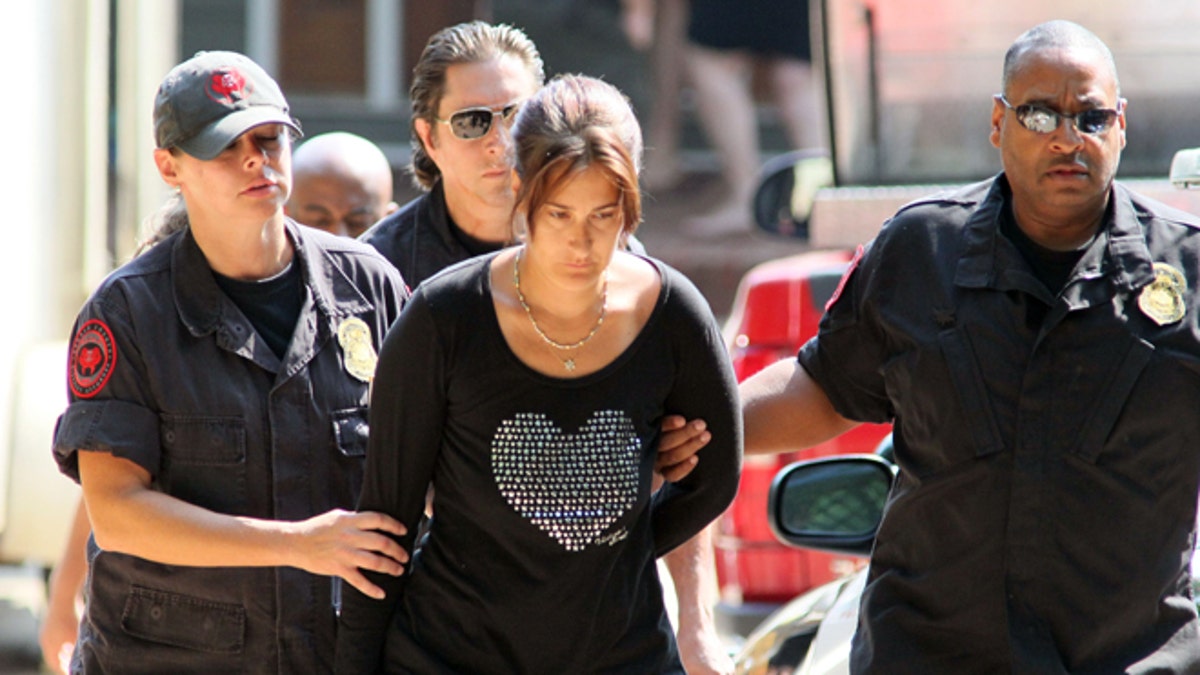
FILE: Aug. 2, 2012: Putnam County sheriff's deputies lead Andrea Sneiderman from her parents home on Lake Oconee near Eatonton, Ga., after arresting her. (AP/Atlanta Journal-Constitution)
DECATUR, Ga. – A Georgia judge agreed Friday to the prosecution's request to drop murder charges against a woman accused of conspiring with her former boss to have her husband gunned down outside a suburban Atlanta preschool.
On the eve of trial, DeKalb County District Attorney Robert James told Judge Gregory Adams that after reviewing evidence that includes records recently provided by the defense, he is no longer sure that Andrea Sneiderman is guilty of orchestrating the Nov. 18, 2010, slaying of 36-year-old Russell "Rusty" Sneiderman.
Adams later officially accepted the motion, MyFoxAtlanta.com reported. Sneiderman still 13 faces lesser charges that include lying to police and hindering an investigation.
"I believe that it would be unjust and unethical for the DA's office, for the state, for the district attorney of this county to go forward on a charge that I am not 100 percent sure of someone is guilty of," James was quoted as telling Adams.
James made the declaration during a sweeping pre-trial hearing ahead of Monday's scheduled jury selection.
Sneiderman, of Decatur, pleaded not guilty to all of the charges, including the now-dropped counts of malice murder, felony murder and aggravated assault.
The case, which has drawn widespread public interest, has always hinged on prosecutors proving that Sneiderman conspired with her boss and alleged extramarital lover, Hemy Neuman.
In March 2012, Neuman was found guilty but mentally ill after determining that he fired the shots that killed Russell Sneiderman. Neuman is serving a life sentence without the possibility of parole.
Andrea Sneiderman has said Neuman was obsessed with her and that she didn't feel comfortable discussing it with her boss because she believed it would have jeopardized her career, MyFoxAtlanta.com reported.
Prosecutors disclosed earlier this week that Neuman would not testify in Sneiderman's trial. James didn't say that was the reason for abandoning the most serious charges, instead citing his recent review of evidence the defense turned over as part of pre-trial discovery.
Thomas Clegg, one of Sneiderman's lead attorneys, balked at the explanation. "I believe they have known all along that they didn't have a murder case," he said in open court.
James called Clegg's comments "a cheap shot." He said: "I have never indicted in a case where, based on the evidence I had in front of me, I didn't believe the individual was guilty. ... I have never actually tried a case, on the other hand, where I had doubts about a defendant's guilt."
It was a rare public back-and-forth in a case that led Adams to declare a gag order on all parties as the judge sought to control, as best he could, the surrounding media frenzy.
Clegg cited the attention in asking Adams to postpone the trial altogether for at least six months and "preferably a year." He made his request after the state's motion to dismiss the primary charges but before Adams had officially accepted them. The judge declined any delay.
Andrea Sneiderman, 37, who has been under house arrest since she was released after her arrest almost a year ago, sat quietly throughout the proceedings.
Rusty Sneiderman, a Harvard-educated entrepreneur, was shot after dropping off the couple's then 2-year-old son on a fall morning two-and-a-half years ago.
Neuman, a Georgia Tech graduate and father of three, was arrested about six weeks later.
Prosecutors have posited that Sneiderman wanted her husband dead to get a life insurance payout and start a new life with Neuman. But she denies any romantic involvement with Neuman. At Neuman's trial, records admitted into evidence showed that Andrea Sneiderman and the gunman talked on the phone multiple times the night before the shooting and, on the day of the shooting, as she drove to the hospital after her husband was wounded.
With Neuman declining to testify, prosecutors are left to seek testimony from a friend of Neuman's, who will be asked to repeat statements she heard from Neuman about his own marital troubles and his relationship with Andrea Sneiderman.
Defense attorneys unsuccessfully argued Friday that rules against hearsay should block Melanie White from telling jurors anything Neuman told her. Further, attorneys argued, Neuman's mental condition, at least as determined by a jury, cast doubt on the validity of anything he may have said.
Adams said he'd allow prosecutors the latitude they want with White, but the defense objections set up a potential avenue for appeal should Andrea Sneiderman be convicted based on the testimony at issue.
The judge declined to rule immediately on defense requests to relax the judge's order that Andrea Sneiderman be confined to her home and not interact with anyone who might be a witness at her trial.
The Associated Press contributed to this report.









































